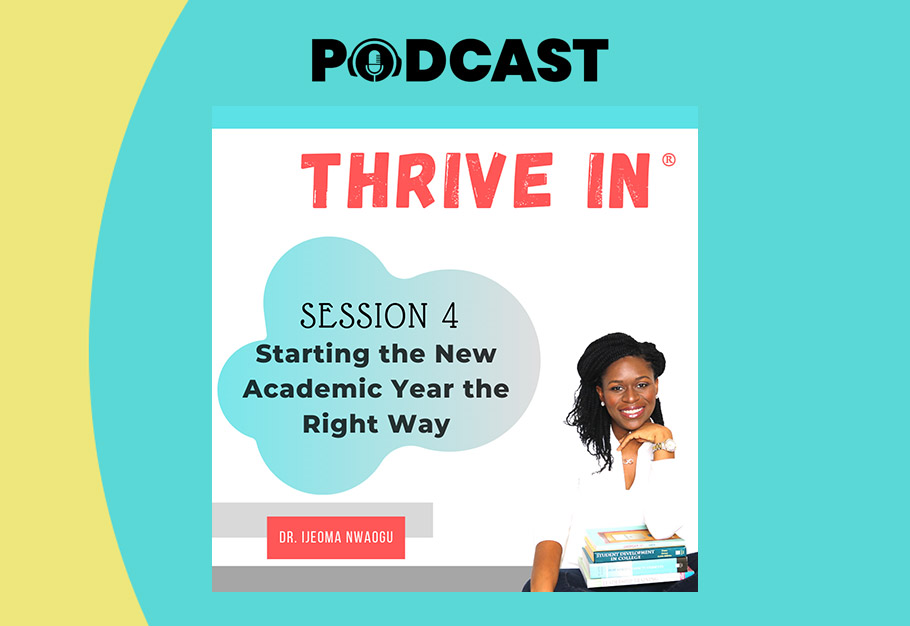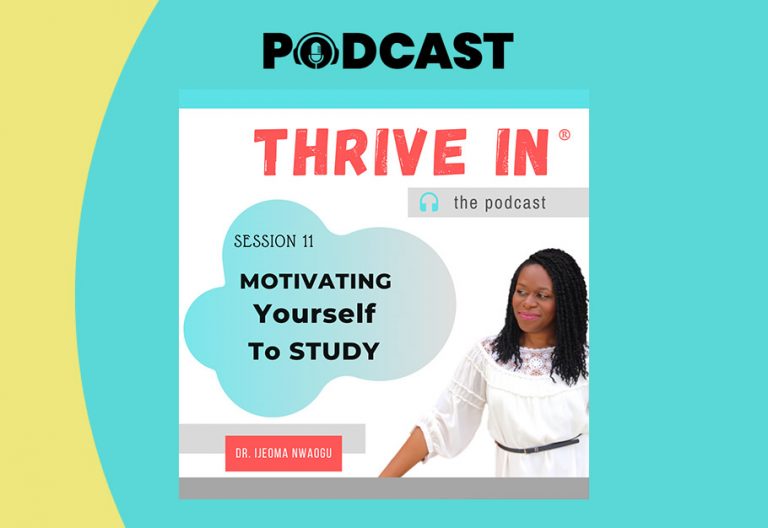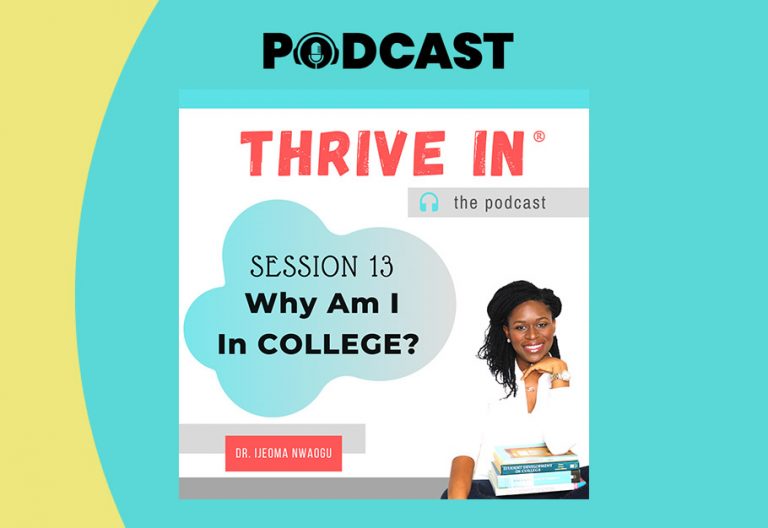00:04
Welcome to Thrive IN™ Podcast and greetings from Houston, Texas. This is Dr. IJ, your very own life coach. Thrive in is a life coaching podcast for college students and believe me, you are in the right place if you’re committed to becoming the highest and truest version of yourself while making the most of your time in college. This is session number four and for this session, I’ll share some tips on how to start the academic year the right way. I’ll also talk about the benefits of carrying out each of the points that I’ll be sharing with you today. So a new academic year has arrived or it might be right around the corner for you, but are you ready to start it off on the right foot? So I totally get it. I understand the excitement, the nervousness, and even the uncertainty you might feel as your new life in college swiftly approaches and I’m sure you could use some advice to rest assured that you’re preparing yourself for a smooth transition into college.
01:08
Now apart from like buying the supplies you need for your living situation and getting ready for your classes, I’d like to share with you 10 steps that you can take to really start shaping your mindset and to help make your first term in college. Start off with a great bang. So if you’re ready to dive in with me, here’s tip number one.
01:29
Tip Number one is to make sure your financial aid is all set. There was a recent study, a recent article that found that roughly 20% of all young adults who plan on going to college right after high school, they didn’t actually show up for the fall semester. And now that is a huge number in my opinion, of students who planned on going to college and ended up not going. I mean that’s a whole lot of students. I don’t want you to fall into that category.
01:58
So it’s really important to understand student loans and get all the required filings completed before school starts. And I know this information might be very new to you. So it’s important to get a parent, a guardian, a sibling, a friend, a mentor, a neighbor, whoever you need to connect with to help you get these necessary filings all setup. And it’s also important to check your notification letters, check your emails and make sure you’re calling or contacting financial aid or visiting their office at your institution to make sure that you’re all set to go.
02:35
Here’s tip number two, do the right things right off the bat. As soon as you plant your feet on your college campus, have the mindset of doing the right things, making the right choices. There are so many movies out there and so much talk about how college life is Super Fun and it is, and I want you to have the time of your life, but you have an entire college career to carry out.
03:03
So make sure you’re making positive decisions and good choices. That leads to positive outcomes right at the very start because your decisions or your actions have a trickle-down effect and it could impact a lot of other things that you want to do or you are trying to do. So it’s important to practice good habits early and as soon as you begin college. This is also important because I want you to preserve a good reputation on campus and starting off by making poor choices or taking actions that are not ideal or fitting to how you want to portray yourself on campus is really important to think about as well and know many people are jokesters and they like to play pranks and I myself was a huge jokester and a prankster in college and I don’t want to take that away from you, but make sure your pranks are safe and don’t cause harm.
03:59
I know you’re building relationships with new friends and want to have the fun in college, but make sure you’re doing it in ways that are within ethical bounds or that don’t get you into the student conduct officer and you have it on your record on campus. So I want to help you preserve your reputation by encouraging you to do the right thing right off the bat.
04:20
Tip number three is to know that you belong and deserve to be in college. As a first-year student, you might feel like an imposter or fraud or feel like you’re undeserving of being in college. But no matter what positive qualities you see in others or how you’re comparing yourself, no, that you earn the right to be in college and because you are there, you deserve to be in that space. So if you end up having these imposter feelings where you feel like you’re not enough or you’re undeserving or you don’t have the skills or the knowledge needed to be a college student, know that people who actually go through these type of anxieties or worries are actually really smart and capable and high achieving people.
05:04
And this is so because you actually care about how you’re performing, how you’re showing up. That means you have high standards for yourself and you certainly possess the skillset, the knowledge and the potential to really thrive. But I know it can be scary because when you look at others and you see the confidence in others and you see how people talk and walk and act and perform, it can be very intimidated while you’re a first-year student to say, Hey, well I don’t possess certain qualities that this person possesses, but I would encourage you to not fall into that comparison trap because you certainly are necessary in that space. Whatever makes you different, your own personality, your unique ways of doing things is so needed in a college setting because you can’t have the same type of people on campus. You need diversity to learn different ways of being, different ways of doing things.
05:55
So know that even when viewing your difference as something that’s bad or undesirable, no, that it’s actually valuable and needed. Your peers in college need to see you. They need to experience you and hear your opinions and hear your thoughts. And I want you to always own that because there is value and power in knowing that you deserve to be in college, knowing that you belong in college and knowing that you are necessary in that space. So I don’t want negative imposter feelings to cloud your thinking. I want you to embrace your college student identity with confidence because you’ve merited that right.
06:32
Tip Number Four for you is to keep a journal. Keep a journal to reflect on your hardships and your successes or any of your life experiences that you’re having in college. College life is so full of new and transformative encounters that will shape your ways of viewing life, your habits, and your goals.
06:51
So I encourage you to document all of your experiences so that you could read about your hardships later on in life and see how you’ve progressed and to see how you’ve grown over time. Journaling is also a good way to reflect on your life experiences and process your experiences to make sense and draw meaning out of them. And if you were to ask me, I think journaling is pretty therapeutic. It really gives you an opportunity to get all your heavy thoughts and feelings out in a constructive way. I also encourage you to keep your journal entries because later on in life you might want to write about your life experiences and you might even write a wildly profitable book about your life. You never know.
07:36
Tip number five for you is to be true to yourself, be true to yourself. This means to be authentic, to be your genuine self. It’s very natural to want to find a group of people that you’re hanging out with, doing life with and it can be pretty tempting to try to fit in. But I want you to find a group of people that you can be your authentic self with and when you’re in different groups, it’s really important to try to be yourself because if you pretend to be something or someone that you’re not, then you’re probably going to attract the wrong kind of people and that’s a huge burden to put on yourself and to try to maintain over time. It’s also important to know what your core values are, what you stand for. Do you value loyalty? Do you value honesty, do you value compassion and empathy? All of those values. I want you to remember what they are because I don’t want you to compromise your values for anyone.
08:35
I’d also like you to ask yourself, is it beneficial to conform in order to fit in? Do you feel like this will add stress to your life or will it add peace to your life? You are wonderful just as you are. People may say bad things about you or not treat you as you’d like to be treated, but it’s really them who has a problem and not you. I’m a huge advocate of giving energy to those who give positive energy back to you and not using up all of your energy to try to conform to the ways of people who are not giving good energy back to you.
09:06
Tip number six is to try not to give in to peer pressure. It’s really easy to be influenced by peers, especially because as a college student, it’s really important for you to try to establish community or friendships and to have a sense of belonging, but I’m a strong believer that there’s no acquaintance that’s worth jeopardizing your integrity, your values, or your reputation for, let’s say you’re in a situation and you get a feeling in your gut that your peers are leading you to bad behaviors.
Speaker 1: 09:36
I encourage you to find the courage which lives within you to remove yourself from those situations, or you could just politely declined from any other activities that involve these people because maintaining a positive college experience is far more important than appearing quote-unquote cool in the eyes of people who are bad influences, which leads to tip number seven which has to flee from toxic people. What do you do when you notice that the people you’re hanging out with continue to repeat these really bad behaviors? Do you remove yourself from their presence as soon as possible? Do you like to spend the rest of your time with them and then promise yourself that you would never visit that same group of people again? Or do you continue to hang out with these people over and over? You never know what kind of situation you might get involved in.
10:24
And then you end up being guilty by association. So if this is your first time in college, you’re likely more vulnerable to be influenced because you’re trying to find your way. You’re exploring and you’re trying to figure things out. But here’s something you could do. You could always listen to your gut and do the right thing. When you sense that something is wrong. I believe we have the ability to listen to our gut, but we just have to tap into that. So I want you to think about this when it comes to substances like alcohol and drugs, which can be harmful if they are abused. So think about it. When it comes to binge drinking or using drugs in college, how will that affect your day today? How will that affect your classes? That’s a decision you have to make.
11:06
Tip number eight is to be mindful of how much you’re partying. Media doesn’t really help with this matter.
11:14
It seems like every turn you make, you see portrayals that give you the impression that college is all about partying and drinking and letting loose in the worst ways. Everything in life is about balance. I believe in work hard, play hard, but playing hard doesn’t mean you need to engage in irresponsible behaviors that have huge consequences. I encourage you to take care of your body, take care of your mind. You are the most valuable asset needed to survive your college life.
11:48
Tip number nine is to take roommate agreement contracts. Seriously. When I was in college my first year, I had three other roommates and we had a resident assistant who had a meeting with us to establish some living rules and to help us come up with a contract or an agreement as to how we’re going to take care of the suite that we lived in and everything involving how we were going to live together.
12:15
And I remember all four of us were like, we don’t need an agreement. Like, why do we need an agreement? We all get along. We’re all gonna get along. There’ll be no problems not knowing that naturally when you’re in a group setting or in your living situation with others, conflict has to happen. You can’t escape it. It’s inevitable. As human beings, we’re not perfect, so we will have misunderstandings with each other. There will be conflict, but just because there’s conflict doesn’t mean that you can’t achieve peace. You can certainly work things out and come up with an agreement so that everyone could be on the same page. If you don’t live on campus and you will have a roommate, this is really important to do as well. It may not be as formal, but it’s really important to come up with an agreement with each other as to how you’re going to live.
12:59
How are you going to take care of the kitchen? Who’s going to clean when? What about music? What about visitors and just come up with all of these agreements together and then document it. Write it down so that everyone can have a copy and revisit it if you don’t remember what was agreed upon. But trust me, once you start living in a space with other people, and let’s say you don’t decide to do a roommate agreement later on, you, you’re probably going to wish that you had that agreement with the person. It’s hard to imagine any potential conflict that may happen, but that’s just what always happened, you know? So it’s better to be prepared in the beginning and to talk things out and to have an understanding as to how you’re going to go about living together. The more you agree on how to live in a space, the more you can avoid conflict.
13:45
Although conflict can still arise, at least you have an agreement to revisit and follow. Or You could even revise or Redo the agreement so that it could match what you both currently think at the moment. And having an agreement can help reduce any feelings of discomfort or any bad feelings you may have about somebody because they’re doing something that you don’t like. So when you have those conversations with your roommates, you could really lessen the heartache that you might have to deal with as early as possible.
14:16
And finally, my last tip, tip number 10 for you, is to ask for help. Ask for help. College is full of people and professionals and professors that are prepared and positioned to help you. There is nothing wrong with asking for help. Yes, you’re smart, but you cannot have everything figured out. That’s what college is for, is to have this gradual learning and to go through this learning process where you’re learning more and more about yourself, about your academics each year.
14:49
You can’t know everything right off the bat. And that’s why there are so many human resources on campus to really guide you, support you, give you the morale boost that you need to keep going. Because college life can be extremely mind-boggling and difficult. It is fun, it is enjoyable, all of that. But of course, it’s a space to learn. And when you’re learning, you can feel stretched. It can feel very challenging. So I strongly encourage you to seek guidance and support. There is absolutely nothing wrong with asking for help. Actually there might be greater problems that come about if you don’t seek help from other people early on it may evolve into something bigger when it was actually something that could have been managed if it was tended to earlier. So I’d like to help you become more aware of asking for help. So when you ask other people for help and they’re helping you, it’s important to talk about some of the things that you’re dealing with.
15:50
Be careful about isolating yourself. Being in solitude is good to help you regain your energy, but be careful about isolating yourself. The two are very different. Isolating yourself means you’re dealing with some sort of anxiety and you don’t want to engage with other people because you’re having a really hard time and you don’t socialize and you don’t do any of those things. You know? I encourage you not to isolate yourself. Seek the help that you need. You’re not bothering anybody. The people on campus are there to help you because that’s their job. That’s what they’re getting paid for. Your peers are available as well. Those you really feel a sense of belonging with are there to help you. Just know that the things, the hardships that you’re dealing with are not just unique to you. They’re very common. The typical homesickness or confusion about class structure and schedules and all of that and how to navigate campus.
16:41
All of that can be overwhelming. You’re not alone in this. People may appear very confident about what they’re doing, but they’re probably just as confused as you might feel. So know that you’re not alone. People that could perhaps help you can include your roommates. If you have a good relationship with your roommate, your resident assistant or your Ra, a peer advisor, a professor that you trust, a college counselor or a student life advisor. There are so many people on campus that can offer you support. You can also call home if you need that morale boost. You don’t have to do life alone. There you have it. 10 tips to make sure you start the academic year the right way. I encourage you to put these actions in memory and put them to practice. When you do sell, you set yourself up for nothing short of success.
17:31
What other tips do you have to start the academic year the right way? I’m curious to learn your stories about how you felt before school started and how you transitioned for your first week. Finally, thank you so much for listening in.
17:46
Feel free to visit, www.thriveinpodcast.com where you’ll find exciting resources just for you. If you’re loving the insights you’re receiving so far, I encourage you to like rate and review this podcast. This will help other college-goers find this podcast.
18:03
Also, send me a message on topics you’d like me to speak about. Follow me or like me on social media at the handle. @drijclc which stands for Dr. IJ college life coach.
I want to end with a snippet of a song I think you might draw inspiration from. You might even consider adding it to your playlist. The name of the song is battle by David Guerra. I hope it motivates you to get mentally prepared for the new school year. Join me for the next episode. Love you.






